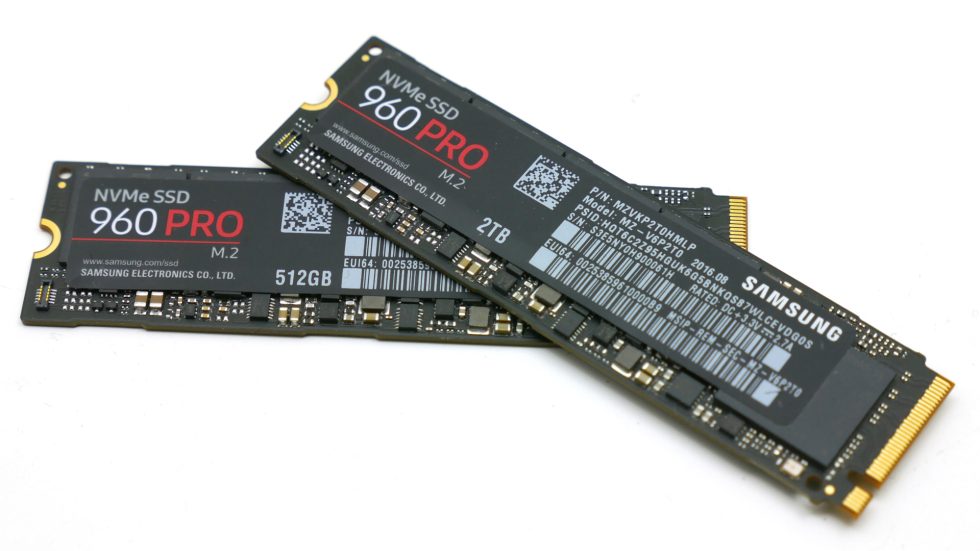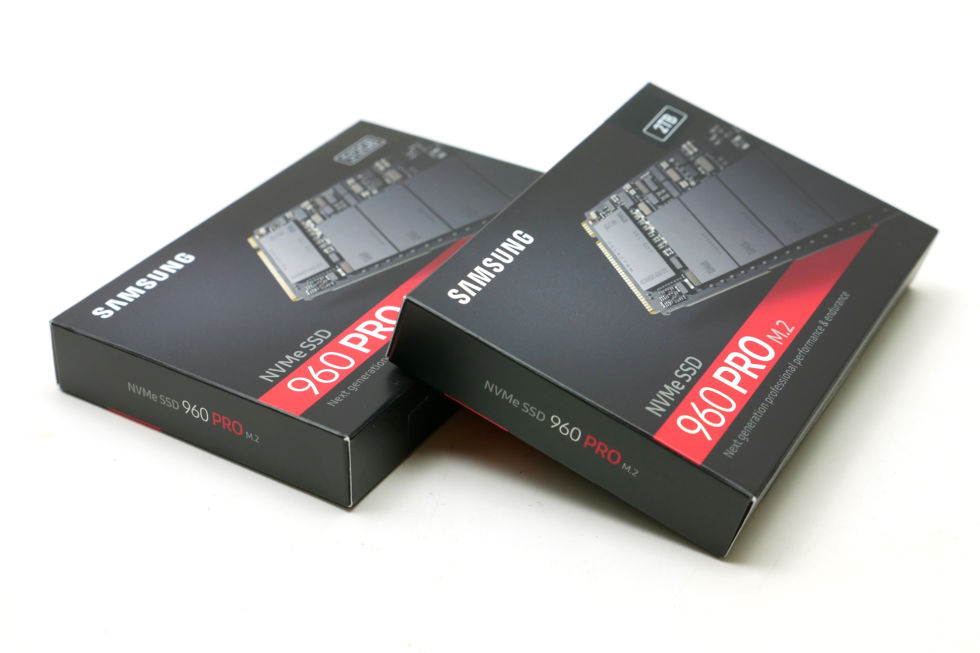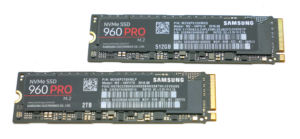
The all new Samsung 960 Pro, released today, is the follow up to last year's 950 Pro. It offers the same core set of features, with an M.2 form factor, four-lane PCIe 3.0 interface, NVMe communication standard, and 3D V-NAND. But the 960 Pro isn't just a minor spec bump. Samsung has seriously cranked up the speed (and capacities) of its flagship drives to the point where such ludicrous performance may be lost on all but the most demanding of users. These are some seriously hardcore SSDs.
Where the 950 Pro was available in just 256GB (buy here) and 512GB (buy here) versions, the 960 Pro starts at 512GB, with 1TB and 2TB versions also available. For the first time, you can reasonably consider replacing an entire array of spinner hard drives or even 2.5-inch SATA SSDs with these things—so long as you've got the cash, of course. With a 256GB starting capacity, Samsung was able to offer the speed, longevity, and warranty of the 950 Pro to those only able to budget £170 ($199) for an SSD. But with the 960 Pro starting at $329 for the 512GB model (probably ~£330), rising to $629 for 1TB, and an eye-watering $1,299 for 2TB, you'll need to save some extra pennies to buy one, or wait it out for the Evo drives Samsung is launching later this year.
Although a marked step down from the Pro range in some regards, the Evos are in theory faster than the 950 Pro drives for less money (thanks to using cheaper and more tightly packed TLC V-NAND). The 250GB will cost just $129 (~£130), 500GB will be $249 and 1TB will cost $470. There won't be a 2TB version of the 960 Evo.
Does anyone really need a drive this fast?
So what sort of performance can you expect if you plump for the 960 Pro? Well, Samsung claims the full range will hit a maximum sequential read speed of 3,500MB/s. That's a massive 1,000MB/s or 40 percent faster than the 950 Pro's fastest option. Meanwhile sequential write speed is rated at 2,100MB/s, which is again 40 percent or 600MB/s faster. All of these speeds bore out in testing.
Samsung is also claiming the drives can manage 440,000 read IOPs and 360,000 write IOPs when it comes to random performance at a queue depth of 32 with four threads. When it comes to even the most intense workloads, these drives should still hold their own. Again, the 512GB model is slightly lower, managing 330,000 IOPs for both read and write. These numbers might not seem that striking when you consider that the 512GB 950 Pro also claimed 300,000 IOPs for random reads. However, for random writes 950 Pro was rated at just 110,000 IOPs, so we're talking about a 3x increase—ideal for heavy users like video editors.


These sorts of performance figures aren't unheard of, particularly in server hardware, but they’re rare and certainly have never been available in consumer drives and in this form factor before. Other alternatives that have been battling with the 950 Pro over the last year include Intel's excellent 750-series, which offers superior random performance to the 950 Pro. But Intel can't match Samsung's sequential performance, not to mention that the 750-series is currently only available in a PCIe-board form factor. There’s also the OCZ RD400A, which again offers performance comparable to the 950 Pro, but comes nowhere near the 960 Pro.
In fact, the closest alternative right now is another of Samsung's drives, the SM961 Polaris, which was released a couple of months ago. This is an OEM product not normally meant for sale to consumers but because it’s based on the same technology as the 960 Pro and offers similar performance, retailers have been selling some of the drives.
They offer up to 3200MB/s read and 1800MB/s write speeds and the range topping 1TB model has even faster random performance with 450,000 read IOPs and 400,000 write IOPs. The drive is also available in smaller 256GB and even 128GB sizes, albeit with reduced performance. The SM961 could make for a good budget option, unless it's pulled from the shelves after the 960 Pro and Evo are released. One thing to note about the SM961, however, is that it doesn't come with Samsung Magician support (which makes firmware updates much easier), and only has a two-year warranty.
Speaking of which, Samsung has reduced the warranty offered on its Pro drives from the ten years of the 950 Pro to only five years for the 960 Pro. This is a shame, but the drives are rated for even higher usage than previous models: up to 400TB, 800TB and 1,200TB of total written data, or 1.2TB of newly written data per day for three years.
reader comments
89